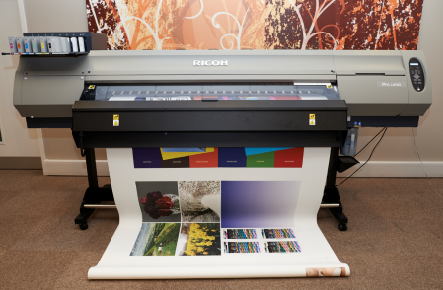This month Nessan Cleary tests the latex printer that marks Ricoh’s first foray into wide-format printing.
The market for latex printers has been completely dominated by HP, despite a challenge from Mimaki. Now Ricoh, which supplies the Gen5 heads used by Mimaki, has entered the fray with the L4100 printer, available in 1.3 and 1.6m widths. Ricoh has rebadged Mimaki's JV400 LX series, and there's no discernible difference between the two apart from the sales and servicing, with Ricoh targeting its existing customer base of commercial printers and corporate print rooms.
The printer uses two Ricoh Gen5 printheads, each head giving four channels. These are greyscale heads, with 4, 6 and 14 picolitre drop sizes. There are eight ink channels, which can be set up for CMYK plus orange and green and two whites, or for two sets of CMYK, though this won't help to speed up the printer. Ricoh uses the same inks as Mimaki, albeit in a Ricoh box, although the inks are chipped to prevent users from swapping between the two suppliers.
It comes with a Rip, marked up as Ricoh Software, but which is actually Mimaki's RasterLink, which is a fairly basic approach. However, Ricoh is also recommending ColorGate's Production House Rip, which has more functionality including a profile manager. You can use this to customise profiles similar to the media in use, which in my experience is extremely useful with latex printers where there is a very delicate balance in the interaction between the amount of ink laid down and the temperature of the various drying stages. Ricoh has commissioned the Dutch company Colour Concepts to make profiles and is slowly building a library of profiles for commonly used media.
The machine itself is relatively straightforward to use. The media is loaded from the rear, so you'll need to leave space behind the machine. It takes 25kg of media, which seems a little light for the 1.6m version; then again, there's no system for assisting the loading and most people would probably struggle to lift heavier rolls into place. There's a powered take-up but it’s not necessary to hold the media under tension. It takes media up to 0.03mm thick and you can adjust the height of the heads to avoid head strikes, but otherwise the profile should do this automatically.
Start-up is reasonably quick and easy, with the machine warmed up and ready to go in just a couple of minutes. It comes with a maintenance kit - essentially Q-tips and cleaning fluid. You also need a set of cleaning blades. There's a capping station on the right hand side, with a cleaning station that scrapes excess ink away from the nozzles. The standard automated maintenance routine takes about ten minutes - the operator only has to check that the seals around the capping stations are intact. In addition, the printer routinely pauses every couple of minutes during printing to clean out the head, which involves squeezing out a small amount of ink into the capping station.
There are two versions of the machine: the L4160 is 1.6m wide and costs £24,995; the L 4130 hasexactly the same specifications, but is 1.3m wide and costs £22,995. The inks come in 600 ml cartridges, each costing £106, apart from the white inks, which cost £67 for 220ml. There are two versions of the ColorGate Rip – Pro, and the more extensive Campaign - and both are also available with an ink optimisation module, that costs more but should reduce the amount of ink used. Prices range from £2,797 to £5,599.
However, Ricoh has missed the opportunity to tie the wide-format Rip into the workflow for its cut sheet printers, even though that’s where the target market lies. The obvious solution would have been a Fiery Rip, which would have linked to Ricoh's existing Fiery front ends and brought Web-to-print functionality with it.
Strangely, there's no warranty, with Ricoh expecting customers to take out a service contract, which costs from £1,655 to £1,734 depending on the number of years committed to. This doesn't include the printheads, which are warrantied to last for one year, and which cost £2,025 each to replace. Ricoh has an extensive support network for its commercial presses with the service engineers aiming to get to customers within four hours, but will this approach appeal much to wide-format customers?


